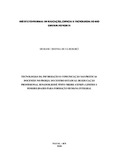Tecnologias da informação e comunicação nas práticas docentes no PROEJA do Centro Estadual de Educação profissional Senador Jessé Pinto Freire (CENEP): limites e possibilidades para formação humana integral

Visualizar/
Data
2018-03-23Autor
Mororó, Dediane Cristina de Sá
http://lattes.cnpq.br/3510441244713432
Metadado
Mostrar registro completoResumo
The present study aims to analyze the forms of appropriation and use of ICT
(Information and Communication Technology) in the context of the teaching practices
of the National Program of Professional Education integrated to Basic Education, in the
modality of Youth and Adult Education, at Centro Estadual de Educação Profissional
Senador Jessé Pinto Freire - PROEJA/CENEP – (State Center of Professional Education
Senator Jessé Pinto Freire) and the possible relations to the proposal of integral human
formation for the students. It is a research of qualitative focus, and has as theoreticalmethodological
reference, aspects of historical-dialectical materialism, based on the
elements, contradiction and mediation that subsidized this analysis. This research was
developed from the bibliographic review, documentary analysis, empirical research,
which was done by the collection and analysis of data from semi-structured interviews
applied to eight professors from PROEJA/CENEP, involving four of the technical
disciplines and four of the propaedeutic disciplines. The bibliographic review was
focused on the literature on education, work, technology, ICT. The results showed that
the professor from PROEJA/CENEP presented an open and flexible relation between
Information and Communication Technologies (ICT) in their electronic character in
order to appropriate and institute modalities of use of these materials, considering the
interest in the development of classes which are more pleasing, dynamic and closer to
students, so that they are credited with using these materials as propellers of significant
changes in the classroom, in a technocentric perspective of replacing artifacts
considered as backward, by those modern electronic technologies that enthrone the
physical space to the virtual, with the use of social networks. This study pointed out
Limits and Possibilities to the integral human formation, related to the limits, with
respect to the perspective of student formation, with the use of ICT, the research
revealed that the professors, predominantly, presented uses of electronic artifacts to
adapt the students to the labor market in a restricted way, in a technicist conception,
without considering the integral human formation, in view of the man in his
completeness. In the case of teacher training for the use of ICT in the context of
PROEJA, the results pointed out that there is an absence of continuous training
promoted by the Education Secretariat's initiative regarding the application of these
materials, however, regarding the possibilities of using the ICT for integral human
formation, the study revealed that in the face of these formative absences of initiative
from the State Secretariat of Education, the professors showed themselves to be
engaged in their own formative paths, starting with dialogue, interaction among them,
and access to continued training courses at Postgraduate level in the Distance or
Presential modality, in order to be concerned with an improvement of their training in
the sense of their performance in the PROEJA context.



